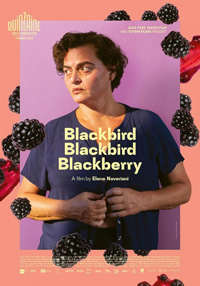The End of the Affair: Naveriani Finds Love in a Hopeless Place
 Georgian filmmaker Elene Naveriani solidifies her gravitational pull towards examining rural social misfits with her elegant sophomore film Blackbird Blackbird Blackberry, a rich character study of a strong willed woman who relishes her independence. It’s no surprise the source material was based on a novel by Tamta Melashvili, reflected in the abundantly textured rendering of a revelatory sexual awakening bolstered by a Virginia Woolf sense of interiority. Eka Chavleishvili, who played a supporting character in Naveriani’s agonizing 2021 debut Wet Sand, impressively takes center stage as an owlish store owner from a small village surrounded by frenemies.
Georgian filmmaker Elene Naveriani solidifies her gravitational pull towards examining rural social misfits with her elegant sophomore film Blackbird Blackbird Blackberry, a rich character study of a strong willed woman who relishes her independence. It’s no surprise the source material was based on a novel by Tamta Melashvili, reflected in the abundantly textured rendering of a revelatory sexual awakening bolstered by a Virginia Woolf sense of interiority. Eka Chavleishvili, who played a supporting character in Naveriani’s agonizing 2021 debut Wet Sand, impressively takes center stage as an owlish store owner from a small village surrounded by frenemies.
Etero (Chavleishvili), a 48 year-old woman who runs her own supply shop in an isolated Georgian village, has eschewed motherhood and marriage, regarded as something of a crackpot by her neighbors. Although Natela (Lia Abuladze) attempts to include Etero in her frequent social gatherings, her presence often ruffles feathers. After nearly falling down the side of a ravine to her death, Etero experiences a kind of sensual awakening, finding herself drawn unexpectedly to Murman (Tempo Chichinadze), a supply distributor who often stops by her shop. Her initiation of a sexual encounter leads to a full blown, all consuming affair. Murman is married and isn’t local, which initially supports Etero’s need for secrecy. But when she’s confronted with the possibility of having to sacrifice her independence to continue the pursuit of their liaison, Etero isn’t so sure she wants to stray too far from her comfort zone.
An unexpected exemplification of the adage ‘better late than never,’ essentially Etero is a nearly fifty-year-old virgin, which her neighbors seem keenly aware of in their gossipy klatches. Although they’re not overtly cruel, it’s clear the village women believe themselves to be better than Etero, pitying her loveless life which they explain as the result of an abusive upbringing with a controlling father and brother. Blamed for causing the death of her mother, whose cancer went untreated after her birth, Etero’s peers desire to see her reflect the same sense of miserabilism they also feel in the wake of their fading beauty, failed marriages and disappointing children.
Gloating over their supposed superiority allows Etero to keep her secrets, receiving enlightenment where she can, perking up when conversation leads to Viagra (although procuring some from the local pharmacy would hardly be kept private). Instead, Etero enjoys her free time, enjoying afternoons on her supply runs in the nearby town, relishing her tradition of ordering mille-feuille. She has existed as a reserved, somewhat thorny person, whose peremptory response towards men expressing their interest is bitchy and rueful. “If marriage and dicks brought happiness, many women would be happy,” she snipes when an admiring gentleman interrupts her pastry time.
The film’s enigmatic title is tied directly to a fascinating introduction to Etero through the opening near death experience, the deeper meaning of which is assisted through eventual context. She has a habit of picking blackberries at a nearby ravine, a treacherous terrain everyone else seems to avoid, which likely adds to her fascination. She falls down the ravine (one of several impressive visual sequences from DP Agnes Pakozdi) after a state of heightened stimulation, touched by a blackbird, the taste of the berries on her tongue. It reveals itself as a sort of recipe for her awakening, as if nature has handpicked her through a game of ‘Duck, Duck, Goose.’
Murman’s promotion, of course, stymies their affair, as Etero doesn’t want to sacrifice her freedom. Like she did with the distressing Wet Sand, which focused on a similarly ignorant close knit community demeaning the corpses of a deceased gay couple, Naveriani dips into private anguish. Like her previous film, a detached niece is on hand as a resource, even though Etero doesn’t really confide in her. Beginning to experience symptoms she’s sure means she’s suffering the same fate as her mother, Etero begins to offload her belongings, talking in code to a pair of friendly women (who likely have secrets of their own) to glean information on a friendly doctor they once mentioned in Tbilisi. Their subtle kindness speaks volumes to someone like Etero, who truly believes she’s absolutely all alone. Simple in its mysteriousness, Naveriani crafts an irresistible portrait of a lady.
Reviewed on May 21st at the 2023 Cannes Film Festival – Directors’ Fortnight. 110 Mins.
★★★★/☆☆☆☆☆


